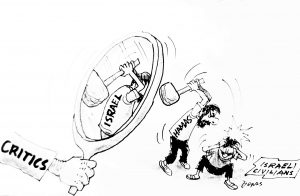Israel’s critics like Russia and China may have taken worse revenge against Hamas had they been terrorized by this group. The conflict between Israel and Hamas has been ongoing for years, with both sides engaged in retaliatory attacks that have resulted in significant loss of life and destruction. While critics of Israel may argue that their actions are unjust or disproportionate, it is essential to analyze the situation objectively.
Hamas, a Palestinian political and military organization, has been using violence as a means to achieve its political goals, including the destruction of Israel. In response, Israel has taken measures to protect its civilians and secure its borders. These measures often involve targeted strikes on Hamas strongholds and infrastructure. While critics may condemn Israel’s actions as excessive, they fail to acknowledge the necessity of self-defense and the need to neutralize a terrorist organization that poses a threat to the region’s stability.
The group often hides among civilian populations, using them as human shields while launching attacks on Israeli civilian areas. This deliberate tactic puts innocent lives at risk and complicates Israel’s efforts to target Hamas militants without causing collateral damage. Critics who solely focus on the casualty count fail to recognize the intricacies of urban warfare and the challenges faced by Israel in minimizing civilian harm. Israel, on the other hand, strives to warn civilians before targeting rocket-launching sites, using techniques such as “roof knocking” and sending text message alerts.
Hamas refuses to acknowledge Israel’s right to exist and has rejected numerous peace agreements. The critics themselves, in their focus on Israeli actions, may inadvertently enable Hamas to continue its violent agenda. By unfairly criticizing Israel, they risk undermining the country’s efforts to defend its citizens against terrorism and encourage a peaceful resolution to the conflict. To truly demonstrate impartiality, it is necessary to acknowledge the context of the situation and avoid falling victim to one-sided narratives.




